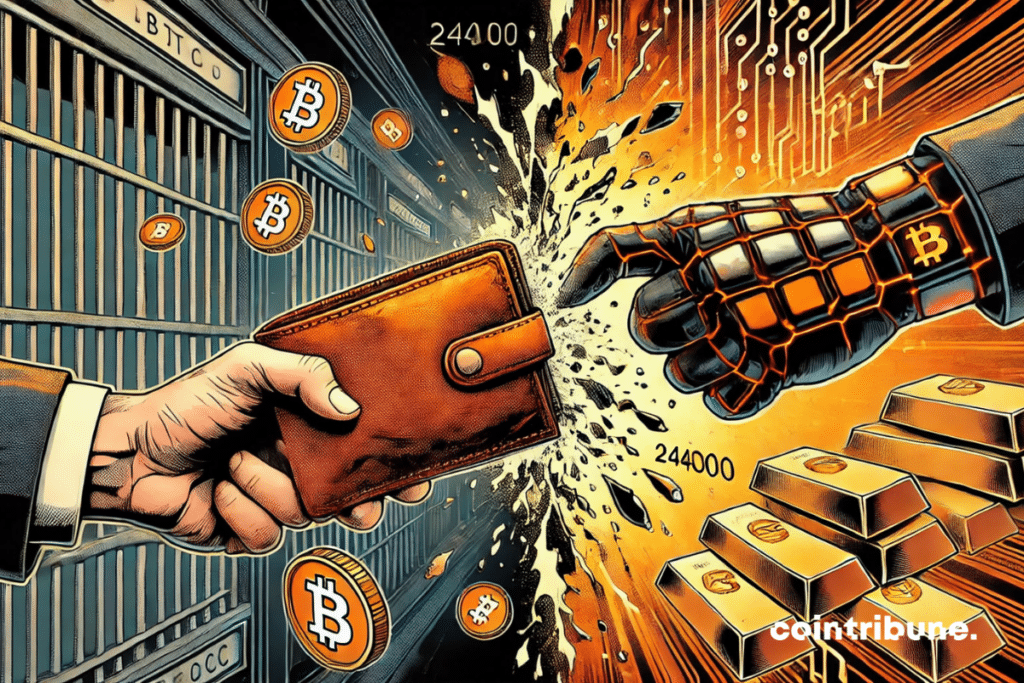Should You Buy Gold Or Bitcoin?
Gold continues to shine, at 3,400 dollars per ounce. A good omen for bitcoin, which will inherit this fortune sooner or later.

In brief
- Gold continues to show a solid increase of +26% in 2025, outperforming most assets.
- Central banks are rushing to gold due to rejection of dollar hegemony.
- Bitcoin positions itself as the logical successor to gold, especially if the United States makes it their reserve currency.
Gold takes the lead in 2025
Gold is experiencing another prosperous year. +26% since January 1st. On the contrary, the US stock market drops 10% while bitcoin is down 6%.
In fact, gold has stood out since the beginning of the war between Russia and Ukraine (2022). It outperforms all major asset classes except bitcoin.
The annualized performance of bitcoin over 3, 5, and 10 years is 22%, 67%, and 30% respectively, while gold shows only 17%, 14%, and 10%.
Two major factors influence the price of gold: inflation and interest rates. These two factors can be combined into a single factor called the real rate.
For example, if the Livret A yields 5% while inflation is 5%, the real rate is 0%. If inflation is 2%, the real rate (or real yield) is 3%, and so on.
When inflation is high and central banks keep rates low on top of that, investors tend to turn to safe havens like gold (and bitcoin).
The strong performance of gold is not surprising given how painful inflation is. In total, we are at 23% in the United States since 2020. The loss of purchasing power is similar in Europe.
Added to this inflation are now major geopolitical tensions that will further exacerbate inflation, at least in the United States. One-year inflation forecasts have soared to 6.7%, the highest level since November 1981…
The end of the petrodollar
Inflation is no longer the main factor behind the surge in gold prices. The cause is strong demand from central banks.
For three years now, their gold purchases have exceeded 1,000 tons per year, well above average levels observed during the previous decade. This means central banks are swallowing nearly a third of the world’s gold production, unseen since World War II. China is a major buyer, as are Poland, Turkey, and India.
Why? Because we are on the brink of a new Bretton Woods. The BRICS no longer want the dollar, and this distrust is not new. It dates back to the 2008 crisis when Western central banks began financing their debt by printing money (Quantitative Easing).
Since then, China no longer considers the greenback a store of value. Its dollar reserves have almost halved, dropping from 1.2 trillion to 760 billion dollars. The recent freezing of 300 billion euros belonging to Russia and customs taxes haven’t helped.
Now, if exporting nations refuse to place their trade surpluses in U.S. Treasury bonds, the United States will not be able to maintain an annual trade deficit of 1.1 trillion dollars. Not to mention the 8.5 trillion dollars they already owe to the rest of the world:
In other words, we will soon need a new international reserve currency. That is why gold is booming.
Gold vs Bitcoin
Unfortunately for the nostalgic of the Gold Standard, Uncle Sam has set his sights on bitcoin.
Certainly, gold enjoys some advantages, notably having stood the test of time. It is also less volatile (about 30% of bitcoin’s volatility) and is not associated with technical risk (bitcoin is software).
For the rest, bitcoin has the advantage and members of the U.S. government understand this well…
If there is one thing most investors know about bitcoin, it is that its supply is capped at 21 million units (of which 94% are already in circulation). Currently, twice as much gold is created as bitcoins (relative to the existing stock).
In short, gold production keeps increasing while the supply of BTC halves every four years. A picture is worth a thousand words:
Moreover, there is no reason to think gold extraction is about to plateau anytime soon. Especially since the energy transition requires mining lots of copper and silver, whose ores often come with gold.
Finally, bitcoin is both a store of value and a payment system, two in one. It is possible to pay with bitcoins, which is much less true with gold. International transfers are moreover much cheaper and much faster.
Bitcoin has a bright future if the declining American Empire makes it its reserve currency. Especially if gold reserves are sold to accumulate more. A bill (Bitcoin Act) proposing to acquire one million BTC is currently circulating in the halls of Congress…
The timing is perfect if you were thinking of parting with your gold to accumulate more BTC.
Maximize your Cointribune experience with our "Read to Earn" program! For every article you read, earn points and access exclusive rewards. Sign up now and start earning benefits.
Bitcoin, geopolitical, economic and energy journalist.
The views, thoughts, and opinions expressed in this article belong solely to the author, and should not be taken as investment advice. Do your own research before taking any investment decisions.